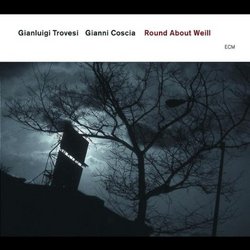| All Artists: Gianluigi Trovesi, Gianni Coscia Title: Round About Weill Members Wishing: 1 Total Copies: 0 Label: ECM Records Release Date: 4/19/2005 Genres: International Music, Jazz, Special Interest, Pop, Classical Styles: Europe, Continental Europe, Latin Music, Tango, Avant Garde & Free Jazz, Modern Postbebop, Swing Jazz, Vocal Jazz, Bebop, Orchestral Jazz, Vocal Pop, Opera & Classical Vocal, Chamber Music, Historical Periods, Modern, 20th, & 21st Century Number of Discs: 1 SwapaCD Credits: 1 UPC: 602498241318 |
Search - Gianluigi Trovesi, Gianni Coscia :: Round About Weill
 | Gianluigi Trovesi, Gianni Coscia Round About Weill Genres: International Music, Jazz, Special Interest, Pop, Classical
|
Larger Image |
CD Details |
CD ReviewsMagical music M. Bauer | Colorado | 05/03/2005 (5 out of 5 stars) "Like this duo's ECM release "In cerca di cibo", this disc has a wonderful old world feel. The combination of trovesi's clarinets and Coscia's accordian suite Weil's compostions well. Beatuiful playing and recording quality. Highly recommended. " HIDDEN JEWELS David Keymer | Modesto CA | 04/22/2006 (5 out of 5 stars) "Gianluigi Trovesi (clarinets) & Gianni Coscia (accordion), Round About Weill (5*) Gianluigi Trovesi (clarinets) & Gianni Coscia (accordion), In Cerca di Cibo (5*) Gianluigi Trovesi is a hidden jewel in today's jazz. Perhaps he's undersung because he's Italian: he performs and records in Italy, not in American jazz clubs or for a central American jazz label. Maybe, on these two albums, it's because some afficionados look down on the "European" clean jazz typical to ECM records. Above all, I suspect it's because the music he plays --though not the way he plays it-- is hard to classify. Take these two albums. Are they jazz? Italian folk music? Composed or 'classical' music? Trovesi and Coscia mesh as well as any duo in jazz --think of the exquisite music made by duos such as Charlie Haden and Kenny Baron, Jim Hall and Ron Carter, or Gary Burton and Chick Corea on Crystal Silence. But the music Torvesi and Coscia produce on these two albums is devilishly difficult to classify. Sometimes they settle for composed lines, heartbreaking melodies played simply, simply. At other times, they clearly improvise, but seldom on recognmizable jazz lines. They are demons --Trovesi especially-- at quoting wildly from other pieces: they close one piece on the Weill album with "Blue Moon," another time with (almost) "Frere Jacques." But it's jazz nonetheless, played by two hyper-alert and super-intelligent musicians who mine their musical ancestry to consummate effect. Of the two albums, my wife has a very slight preference for the Weill album, which is made up half of tunes written by Weill and most of the rest of the artists' own tunes that fit the mood of Weill. Both clarinet and acordion capture well the cabaret atmosphere of so many Weill tunes, including different versions of "Alabama Song" and "Tango Ballade." On the Weill album, Trovesi continues his fascination with John Lewis's "Django," the moving funeral dirge for French gypsy guitarist Django Reinhardt first recorded by the Modern Jazz Quartet. (Trovesi plays "Django" on In Cerca di Cibo and quotes it on Around Small Fairy Tales.) This is appropriate because in some respects, Trovesi is like Lewis, though much hotter and more earthy at times. Both composed and have led groups that played music that critics saw as too 'classical.' Both used non-jazz idioms for jazz purposes. I own five albums by Trovesi now, which is all I've been able to find and buy to date. Around Small Fairy Tales features Trovesi playing his own compositions with a string orchestra. From G to G and Fugace feature his octet, which sounds at times like a slightly woozy stepchild of the great George Russell experimental groups of the very early sixties. In an age that slights the clarinet as a solo instrument, Trovesi is arguably the best clarinetist in jazz, a major soloist and melodist. I love this man and he's never sounded better than playing with Coscia. Needless to say, these two ECM albums are impeccably engineered for sound. Dave Keymer" Innovative and dreamlike William A. Adams | Bainbridge Island, WA USA | 10/24/2005 (4 out of 5 stars) "The two reed instruments complement each other wonderfully in the tonal range of the human voice. They are smoothly blended even in stacatto pieces. Coscia reminds me of Dino Saluzzi, not as expressive, yet more rhythmically emphatic than Saluzzi and with much more variation in style. Trovesi's clarinet has a beautiful, liquid sound. The music varies from oom-pah folk to hypnotic wandering, all of it inventive. There are no cliches here. Reviewed well in Downbeat, but is it jazz? There is a classical foundation, but the rhythms, harmonies and melodies are all over the map. Even so, there is a certain sameness that sets in after a while, due to the limited pallette."
|

 Track Listings (23) - Disc #1
Track Listings (23) - Disc #1